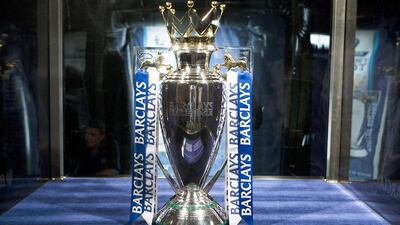For the past 15 years, Barclays has used the global popularity of Premier League football to gain footing in new markets. Next month, its reign as title sponsor ends, a reflection of the league’s growing ambitions and the bank’s shrinking ones.
Barclays’ strategy has changed in the three years since it last renewed the £40 million-per-year sponsorship (Dh208.8m). About £20 billion of profit has been wiped out by misconduct charges over the past five years, and its plans for global dominance have been retrenched.
Since 2014, Barclays has withdrawn from its European retail operations in Spain, Italy and Portugal, and in March announced plans to leave Asia and Africa, regions where the Premier League counts some of its most avid fans. As well as turning away from seven Asian countries, Barclays is looking for a buyer for a 62 per cent stake in Barclays Africa. The focus for now is on core business in the UK and the US.
It has also pulled back from other high-profile sponsorships, including the tennis World Tour Finals. “The thing you pay the big money for, which is to put your name on the top, no longer was relevant for us as a business,” Nathan Homer, the Barclays global head of sponsorships, said in an interview.
At the same time, the Premier League has grown unabated. Television revenue will be US$2.5bn a year as of next season, and the value of the title sponsorship has grown more than tenfold in 23 years.
To capitalise on its own popularity, the league has decided to forgo a title sponsor entirely. Like the National Football League, the Fifa World Cup and the Olympics, the Premier League will instead try to add sponsors in each of seven categories. Nike has become the official ball sponsor, Electronic Arts is the sports technology partner and the league is close to naming an official brewer.
Barclays will stay on as the official bank. “It couldn’t have suited us better,” said Mr Homer, who said the role will cost Barclays about one quarter of what it paid for the title sponsorship.
Looking back on one of football’s longest-lasting commercial relationships, Mr Homer said Barclays got more than an advertising boost. The deal required the league to use the bank for all of its financial transactions, which have increased significantly in number and value over the years.
“Overseas rights have gone from just under £50m in year one to nearly a billion a year now – all of that had to come through foreign exchange to become pounds in the bank,” he said. “So there’s a very attractive revenue side to becoming a partner with the Premier League before you even think about all the benefits a marketing partner would enjoy.”
Fourteen of the league’s 20 teams also bank with Barclays, giving it access to millionaire players, coaches and deep-pocketed owners. Meanwhile, the relationship gave Barclays instant recognition in its new target markets – the Premier League is watched in 212 territories and its most famous team, Manchester United, claims to have a global following of 659 million.
“As we expanded, it was a very simple awareness and brand stature that worked very efficiently – ‘if Barclays can afford to sponsor the Premier League they must be a serious player in the business’,” Mr Homer said.
business@thenational.ae
Follow The National's Business section on Twitter

